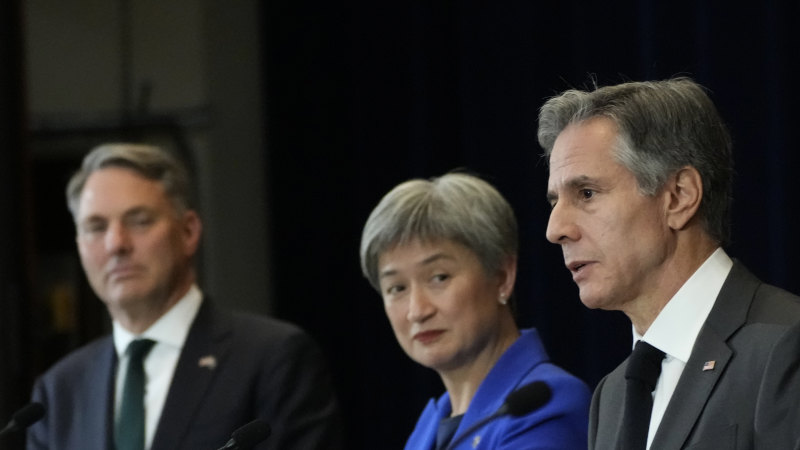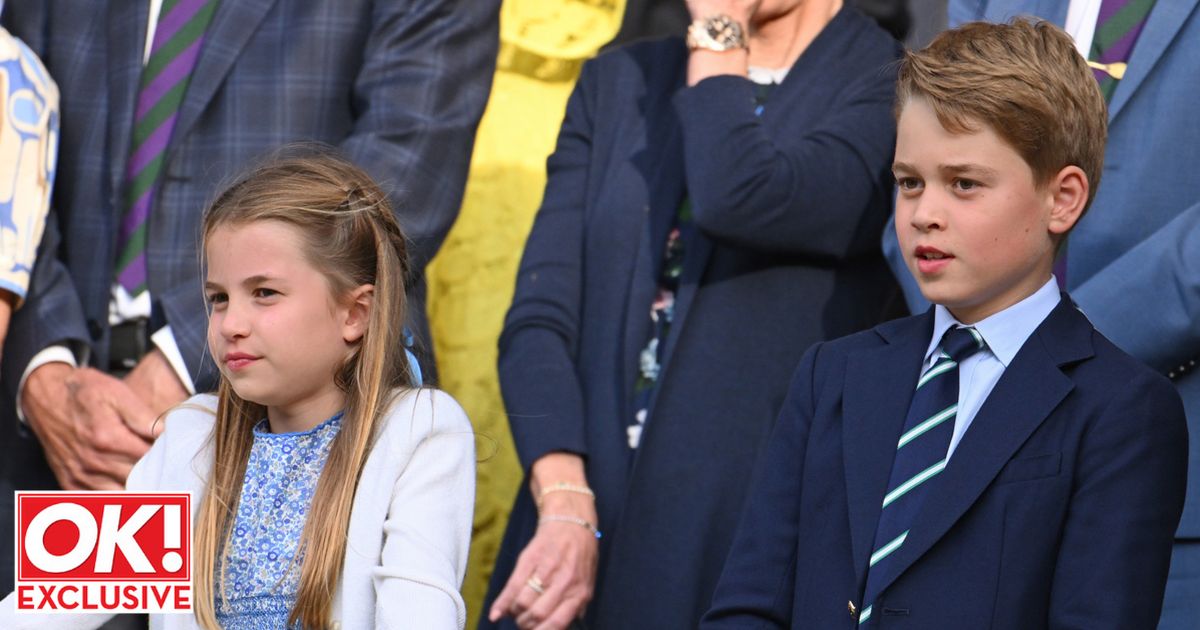Save articles for later
Add articles to your saved list and come back to them any time.
Two months after US President Joe Biden’s planned trip to Sydney and Canberra was abruptly cancelled, two of his most senior cabinet officials are arriving in Brisbane with an important task: to reassure Australians that the “optimal pathway” to acquiring nuclear-powered submarines isn’t veering disturbingly off track.
The annual Australia-US Ministerial (AUSMIN) consultations are supposed to see the alliance partners’ top defence and foreign affairs ministers travel to each other’s countries in alternating years, but the past three meetings have been held in Washington, DC.
(Left to right) Defence Minister Richard Marles and Foreign Minister Penny Wong with US counterparts Antony Blinken and Lloyd Austin in Washington last year.Credit: AP
When Australia held its most recent AUSMIN meeting in 2019, Donald Trump was in the White House, no-one had heard of COVID-19 and the Morrison government was committed to buying a fleet of conventional submarines from France.
Speaking before US Secretary of State Antony Blinken and Defence Secretary Lloyd Austin’s trip, a senior State Department official stressed to reporters that the AUSMIN meeting “isn’t about AUKUS”.
“AUKUS certainly is something that would come up in the context of the discussions, but AUKUS also involves the United Kingdom, and the United Kingdom are not involved in this meeting,” the official said.
Like it or not, however, AUKUS will dominate Friday and Saturday’s AUSMIN meetings given the US Congress is currently debating legislation to turn the three-nation pact into a reality.
Negotiations hit a speed bump last week when Senate Republicans announced they would block legislation to allow the sale of US Virginia-class submarines to Australia unless Biden boosted funding for the domestic production line.
There is a persistent strain of commentary in Australia that we are being fleeced in the undeniably expensive submarine deal, exemplified by former foreign minister Bob Carr in this masthead this week.
The submarine deal, Carr wrote, amounted to a “whopping subsidy to American naval shipyards” and showed Australia to be a “deliriously loyal, entirely gullible US ally”.
The discussion in the US is entirely different: handing over the US Navy’s “crown jewels” to another nation, even an ally such as Australia, is seen as an act of generosity. Far from trying to hawk its subs on the open market, the US is failing to meet its own domestic production quotas and does not have spare capacity to provide any boats to other nations regardless of the price.
That’s why Republicans like Roger Wicker, the top Republican on the Senate armed services committee, are playing hardball in the congressional negotiations. It’s not that they oppose AUKUS, but they want to ensure the US Navy is not shortchanged as a result of the pact.
There are valid questions to ask about whether the Biden administration has done enough to address these concerns given senior Democrats and Republicans were warning before Christmas that AUKUS risked pushing America’s industrial base to breaking point.
At this stage, Wicker’s objections are widely seen as a negotiating ploy rather than a serious threat to the planned sale of three to five Virginia-class submarines to Australia.
But it’s an important reminder of the risks involved in such a complicated, ambitious project.
The Albanese government’s efforts to sell the benefits of AUKUS to the Australian public have so far been underwhelming: according to the Lowy Institute, most Australians support acquiring nuclear-powered submarines but just 27 per cent believe we should spend up to $368 billion over 30 years doing so.
And as tightly bonded as our two nations are, there’s a noticeable scepticism in Australia about its most important security partner: two in five Australians say they have little to no trust that America will do the right thing for the world, a significantly higher level of distrust than for Japan, the UK and France. Such scepticism is understandable given the Iraq War fiasco, the chaos of the Trump years and the botched withdrawal from Afghanistan.
Blinken and Austin undoubtedly feel on friendly ground in Australia, but it’s not quite as friendly as they may imagine. Far more than a breezy photo opportunity, their visit provides a timely chance to reassure Australians not just about the future of the AUKUS submarine plan, but America’s reliability as an ally and its commitment to the Indo-Pacific.
Cut through the noise of federal politics with news, views and expert analysis. Subscribers can sign up to our weekly Inside Politics newsletter here.
Most Viewed in Politics
From our partners
Source: Read Full Article



